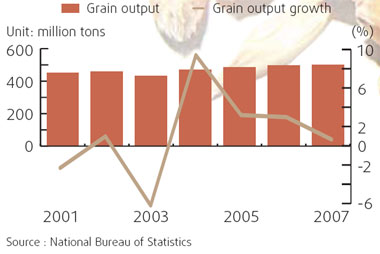China is making great progress in reaching its goal of increasing its national grain output, aided by the accelerating development of agricultural technologies and innovations, experts said.

Economists expect that with the rising yield per unit of arable land, the nation will reach its target of ensuring self-sufficiency in a wide range of grains and other foods in the foreseeable future.
Zhang Lubiao, a senior official of the Chinese Academy of Agricultural Sciences (CAAS), said China must continue to satisfy 95 to 100 percent of its own consumption of major grain products to ensure national food security.
The latest figures from the National Bureau of Statistics showed the total output of summer grain in 2008 amounted to 120.41 million tons, up 2.6 percent from the year before, an increase for the fifth consecutive year.
The yield per mu (0.06 hectare) reached 299.5 kg, up 2.5 percent from the same period last year, marking the record high based on available figures for the past five years.
Agricultural experts said the total grain output increase was achieved mainly as a result of improvement in the yield per unit rather than expanding planting areas.
As the possibility of increasing new arable land is extremely limited in China, the only way to sustain the increase in grain output is to further develop agricultural technologies.
"The available planting area is quite limited in China, with little possibility for it to be increased in the future. Therefore, the improvement of yield per unit becomes crucial to increasing grain output in the longer term," said Zhang.
Established in 1957, the CAAS is the country's most authoritative agricultural research institute, which is directly affiliated to the Ministry of Agriculture.
Zhang said there is plenty of room for China to improve agricultural technologies through cooperation with other countries in various fields, including seed breeding, irrigation and harvesting.